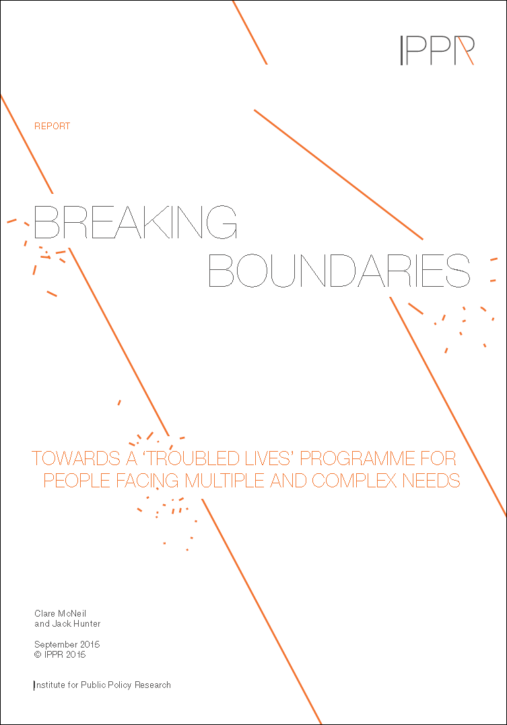The Work Programme – cheaper but not better

The Committee criticises the Work Programme for failing to find work for 70% claimants who it says require more personalised and intensive support to address complex barriers to working.
Helping people with complex needs to lead less troubled lives

IPPR put forward the same rationale that was advanced to establish the Troubled Families programme; that the current response to people with complex needs is still largely reactive and uncoordinated, mainly consisting of expensive crisis services rather than preventative work.
Putting Social Impact Bonds to the test

Finally, five years since the first impact bond, we have yet to see whether impact bonds will lead to sustained impact on the lives of beneficiaries beyond the impact bond contract duration. The existing literature states that impact bonds could lead to sustained impact by demonstrating to government that a sector or intervention type is worth funding or by improving the quality of programmes by instilling a culture of outcome achievement, monitoring, and evaluation.
Interact with Payment by Results

Get involved in new PbR interactive tool: Send in examples of PbR evaluations and research, particularly any “grey” material not publicly available; Express an interest in attending one of the consultation workshops or in piloting the tool.
What did we learn from the Doncaster prison PbR reoffending pilot?

Sodexo and NACRO are the new partnership running the South Yorkshire Community Rehabilitation Company and it will be interesting to see whether they can have a positive impact on reducing the reoffending of released prisoners – their results will also be subject to a payment by results contracting approach, this time using both a binary and frequency (but not severity of offence) payment model.
An analytical framework for payment by results (NAO 6)

Like many of us, the NAO is in a slightly awkward position in regards to payment by results. On the one hand, it is reluctant to recommend that any public programme adopts a PbR approach because there does not, as yet, exist an evidence base that suggests it is an effective commissioning approach.
Monitoring & evaluating payment by results (NAO 5)

The NAO makes a very strong recommendation not only that all government payment by results schemes should be evaluated but that these evaluations should be shared across government in order to develop a more robust evidence base for PbR; indicating whether and how this commissioning model should be utilised.
Designing payment by results schemes (NAO 4)

The NAO cautions that in designing PbR schemes, commissioners need to get the balance between pure PbR and non PbR payments right. Where a scheme is financed by a Social Impact Bond, it may be possible – and indeed appropriate – to stipulate that 100% income is dependent on achieving the specified outcomes.
Does payment by results work? (NAO 3)

To date, government has mainly used payment by results as a cost-cutting exercise with PbR focusing attention on the bottom line rather than on achieving more sustainable outcomes which benefit society and bring long term savings to the public purse.
Whether to use payment by results? (NAO 2)

Are the NAO’s features a copper-bottomed guarantee of an effective PbR scheme? Or are you more in agreement with me that the attraction of PbR is the chance to move away from the straight-jacket of contemporary procurement and stimulate fresh approaches, under-written by the knowledge that if a provider fails, the commissioner doesn’t have to pay?
Government co-ordination of payment by results (NAO 1)

PbR schemes are typically targeted at intractable, multi-faceted social problems with the hope that an outcome-focused approach will encourage innovation and more holistic responses. If government departments cannot even co-ordinate their commissioning around PbR, it will be very difficult for providers to design and deliver new solutions.
Drug recovery Payment by Results pilots fail in first year

The researchers come to the very fair conclusion that PbR is not a straightforward guarantee of improving performance in drug and alcohol recovery. Although previous studies have shown that PbR can drive some limited improvements in quality, this study unambiguously found that: “the introduction of payment for outcomes had a significant, negative impact on successful treatment completion.”
